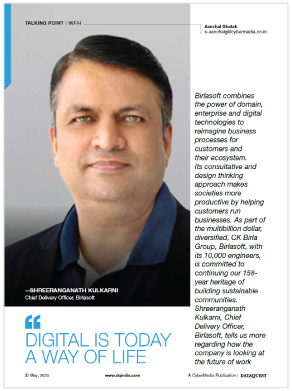Birlasoft combines the power of domain, enterprise and digital technologies to reimagine business processes for customers and their ecosystem. Its consultative and design thinking approach makes societies more productive by helping customers run businesses.
As part of the multibillion dollar, diversified, The CK Birla Group, Birlasoft, with its 10,000 engineers, is committed to continuing our 158-year heritage of building sustainable communities.
Shreeranganath Kulkarni, Chief Delivery Officer, Birlasoft, tells us more regarding how the company is looking at the future of work. Excerpts from an interview:
DQ: How are you dealing with the Covid-19 situation? What plans have you put in place?
Shreeranganath Kulkarni: The COVID-19 outbreak is deeply concerning, and we are aligned with the world’s governments and health care leaders to ensure the safety and well-being of human lives while fighting this global pandemic. We are committed to supporting our customers’ business and to providing continuity of service.
Birlasoft has formed a COVID-19 Leadership Taskforce that meets regularly every single day, to assess the current situation. We have established a WAR room for project teams to easily reach us and use the latest information to answer questions that arise from employees, customers and suppliers to ensure we have the best response and that we all stay connected.
Birlasoft has an appropriate Business Continuity Plan in place, and we will continue to take necessary steps to ensure the safety of our employees while providing support to our customers, during this time.





